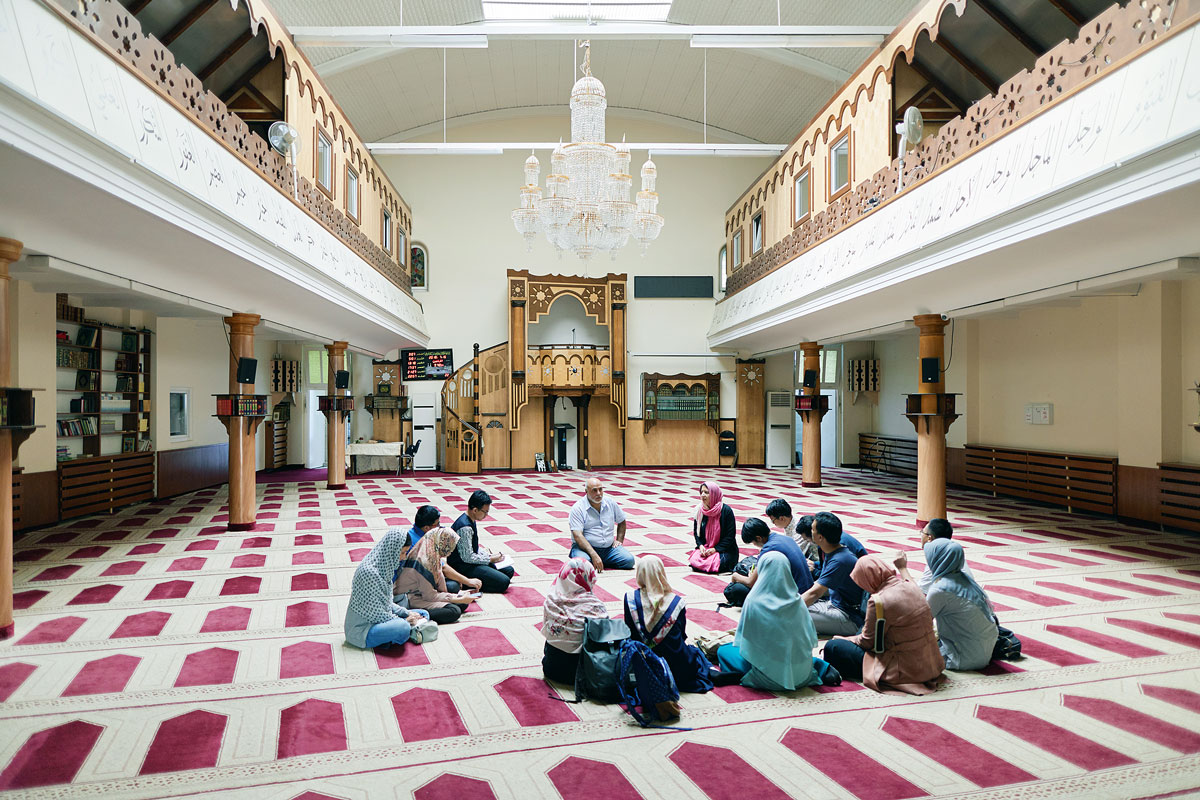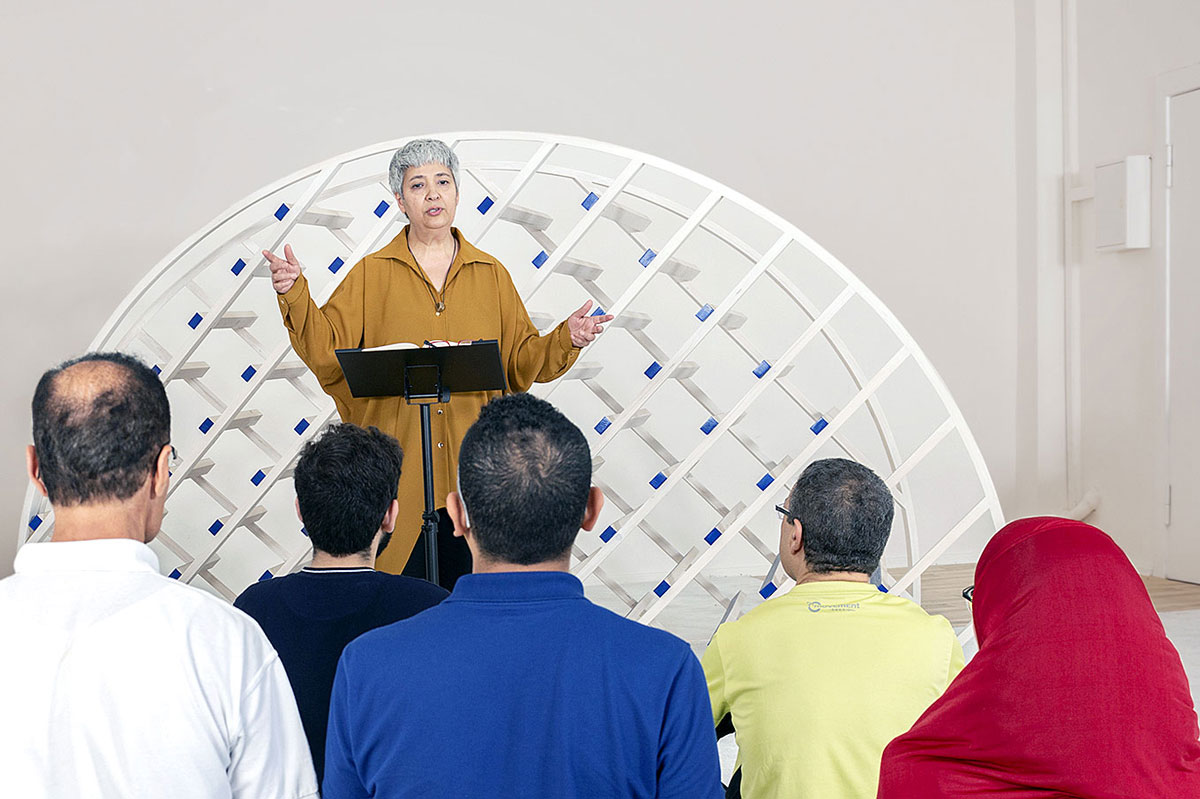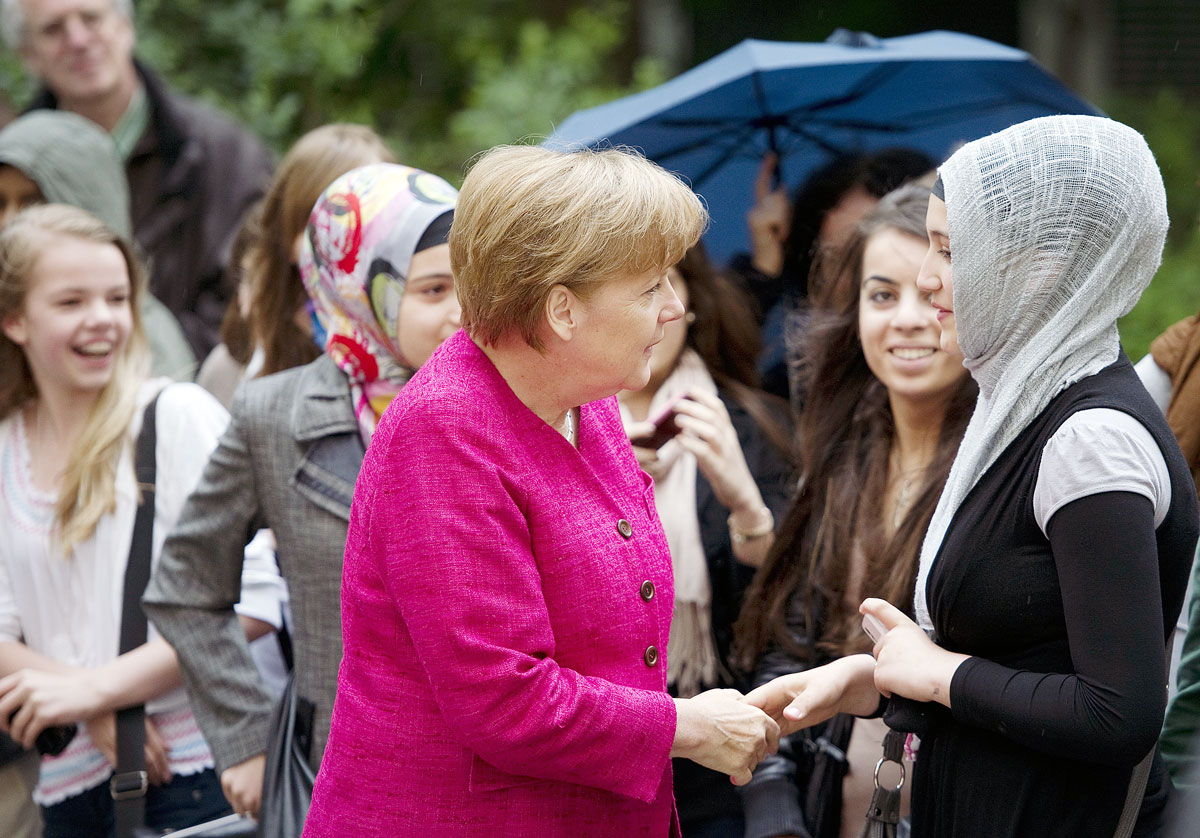A group of Indonesian journalists and scholars recently visited Germany at the invitation of the Goethe Institute Indonesia to obtain first-hand information about Muslim communities in the European country. The Jakarta Post’ writer Safrin La Batu explored the various expressions of Islam there as well as the challenges the communities face as a religious minority in a country that guarantees freedom of faith
An elderly couple relaxed in front of Şehitlik Mosque, one of Berlin’s most important landmarks and best attended mosque. The place of worship belongs to a segment of the Turkish Sunni-Islam community that calls it Sehitlik Camii in their native language.
Şehitlik boasts a distinctive architectural design. The huge dome is flanked by towering minarets, a hallmark of 16th and 17th Ottoman architecture. It is a popular hangout spot among senior Turkish migrants. There, they chat and sip Türk çay, or Turkish tea. The Turkish language is a medium through which they can relate to their roots.
In Germany, where secularism separates the state from religious institutions, Muslims are divided into various complex organizations. Many are associated with major sects, such as Ahmadiyah, Syiah and Alevis, while others join nation-based Islamic groups. Arabs, Turks and Indonesians, for instance, have their own religious communities.
However, these differences do not necessarily ghettoize these communities. They mix at public events and come together as one when confronting common issues such religious persecution and Islamophobia, spurred by global terrorism committed in the name of Islam.
Şehitlik, which also functions as a Turkish cultural center, mainly serves the Turkish Islamic community in Berlin. Sermons are delivered in the Turkish language because not every worshipper speaks German or understands Arabic, the language of the holy Quran. Howev-er, non-Turkish people still can attend mass prayers thanks to a translation service. Friday sermons are simultaneously translated into Arabic and German.
“Not every Turk [in Germany] speaks German,” said Levent Yükçü, a member of the mosque’s community. Numbering more than 2 million, Turks are the largest minority ethnic group in Germany.
The mosque is the best attended in town. On a typical Friday, up to 2,000 people of different nationalities take part in the weekly service. On Idul Fitri, the congregation could swell to 5,000 people and the police would close the area to allow worshippers to roll out mats and pray on the streets, said Yükçü. In addition to its regular religious services, Şehitlik also runs a deradicalization program.
Indonesian Muslims also have their own mosque called Indonesisches Weisheits und Kulturzentrum (Indonesian Center for Wisdom and Culture), better known as the Al-Falah Mosque. It is a cultural center but most of the time it functions as a mosque.
But not all mosques cater to specific communities. Dar Al-Salam NBS Moschee and Kulturzentrum in the Neukölln neighborhood is one such mosque. Established in 2007, the mosque aims to embrace Muslims from all denominations and nations of origin.
“Everyone is welcome here. Muslims, non-Muslims, Germans [...] Our door is always open,” said Abu Hamzah, a member of the Dar Al-Salam congregation.
He shot back when asked if followers of Syiah and Ahmadiyah, minority sects deemed heretic in certain countries like Indonesia, were welcome to pray at the mosque. He said: “Why is everyone asking about mazhab [Islamic schools of thought]? We are all Muslims. We should set aside our differences.”
To build a good reputation, the mosque reaches out to local Muslim communities. During Idul Fitri celebrations, for example, the mosque invites neighbors to come and celebrate the festivity together.
“In 11 years [since its establishment], we have never had a fight with our neighbors,” said Hamzah, who hails from Palestine.
There are more than 4 million Muslims in Germany, accounting for 4 to 5 percent of Germany’s population of more than 82 million people. This may sound small but it is the second biggest religious group after Christianity.
About 74 percent of the Muslim population is Sunni, 13 percent Alevis and 7 percent Shiite, while the rest are followers of other minority sects, such as Ahmadiyah, Sufi or Muslim mystics, Ibadi and other unspecified sects, according to a 2010 report released by the German Islam Conference, a dialogue organization sponsored by the German Federal Minis-try of the Interior.
Susanne Kaiser, an expert on German Muslims, said the nature of Germany’s secularism, commonly referred to as “secular neutrality” was one reason Muslim communities did not clash with one another, as the state guaranteed everybody the same freedoms.
“Particularly in regards to violence, the state is obliged to prevent attacks,” she told the The Jakarta Post.
Interfaith dialogues
Religious communities are strong advocates of interfaith dialogue. Communities like Şehitlik and Dar Al-Salam have regular interfaith programs that they conduct independently or in collaboration with other faiths.
Every Ramadhan, the Dar Al-Salam hosts “interfaith iftar”, with different faith groups invited to the breaking-of-the-fast events. The initiative is intended to improve understanding among faith communities and to discuss what they can do together to meet common challenges.
Through Al-Falah, Indonesian Muslim communities also regularly participate in interfaith dialogues jointly organized by Christians and Jews. Topics vary from religious issues to social ones, such as how to cope with the lack of Islamic kindergartens in Berlin.
“Sometimes we meet here and sometimes at a church,” said Muhammad Ihsan Karimi, the Al-Falah chairperson. “We want to create programs that directly benefit our society.”
Among the non-Muslim organizations working together with local Muslim communities is the Berlin-based Evangelical congregation of St. Peter (also called St. Mary), which is the oldest church in the city and among the few remaining Middle Age buildings.
The congregation is planning to build the House of One — a house of worship that Jews, Christians and Muslims can share. The concept is simple. An iconic pavilion built in the center of Berlin, with three sections that will function as a church, mosque and synagogue, respectively. Each section will be connected to the others by a chamber at the center of the building where inter-religious dialogues can take place.
“We will put them [the three prayer sections] under one roof but not in one room. All three will co-exist as a community,” Rev. Eric Haussmann, a pastor at St. Peter, said.
The project, which will officially commence in October and will take two years to complete, is being funded by private donations. Hassmann said the House of One was inspired by Marthin Luther King’s sermon at St. Peter Church in 1964, when the city was still divided by the Berlin Wall.
Muslim communities are also active in responding to major incidents, especially ones involving their brethren. For example, they took part in a solidarity campaign to denounce the massacre at the office of the Paris-based satirical weekly Charlie Hebdo in January 2015. The shooting, which killed 12 people and injured 11 others, invoked worldwide sympathy through the hashtag #JeSuisCharlie. The perpetrators of the incident were two brothers who identified themselves as members of Al-Qaeda, a terror organization based in Afghanistan.
Indonesians can learn from the Muslims of various sects and nationalities in Germany that peacefully co-exist and nurture good relations with people from other faiths — something that the multicultural Indonesia is increasingly struggling to sustain.
 Feeling at home: Indonesian students have a discussion in the Dar Al-Salam NBS, a mosque that also functions as a cultural center. (Goethe Institut/Bernhard Ludewig)
Feeling at home: Indonesian students have a discussion in the Dar Al-Salam NBS, a mosque that also functions as a cultural center. (Goethe Institut/Bernhard Ludewig)
Muslims at the center of hot-button integration issue
When soccer player Mesut Özil announced his decision to resign from playing with the German national team last month, analysts were aware that the pendulum of the old integration debate was swaying back. Özil clearly stated that “racism and disrespect” were the reasons he quit defending his country’s team.
“I am a German when we win, an immigrant when we lose,” Özil, who was born to Turkish parents, wrote in a letter posted on his Instagram account.
Integration is always a contentious issue in Germany. For many Muslims born in the country but with immigrant parents or grandparents, the question of integration is irrelevant. Özil, for example, has always avoided talking about his heritage in the media. For him, he is a German, not a “hyphenated” German. In 2015, he was furious for being referred to as German-Turk.
However, right-wing politicians have always fanned the debate because it can appeal to voters who are dissatisfied with Chancellor Angela Merkel’s decision to receive more than 1 million refugees from the Middle East two years ago.
Muslim integration is a classic debate. In 2010, Thilo Sarrazin, a board member of the Bundesbank, the German central bank, had to resign from his position after he wrote a controversial book, in which he accused Muslims, especially Arabs and Turks, of “not making efforts” to integrate and “dumbing down” German society.
Many Germans consider Sarrazin’s ideas as “racist”. Recently, a publisher refused to publish his new book, Deutsche Welle (DW) recently reported.
“Actually there is no question that Muslims are not integrated. But there is always this debate,” says Susanne Kaiser, a senior journalist and expert on German Islam.
Many young Germans today are more open-minded. For example, at an organization called the Young Islam Conference, a group of young people, Muslims and non-Muslims alike, stand up against bigotry by countering the profiling of Islam and immigrants.
However, stereotyping and prejudice persist thanks to the right-leaning media.
Muhammad Syarqawi, a Palestinian immigrant who runs an Arabic coffee shop in Berlin’s Sonnenalle Avenue, says the street is often referred to as a crime-laden area simply because many Muslims live there. Sonnenalle Avenue is also called Berlin’s Arab street because many Arabs, also Turks, run shops there.
“Crimes sometimes happen here but they’re not a big issue. Crimes happen anywhere else,” Syarqawi says. “The media gives a [bad] picture of the street.”
Kaiser says the media often report about Islam from the perspective of conflict in the Middle East and this further exacerbates the already biased depiction of Islam. This adds to the stereotyping and prejudice toward Muslims as a whole.
Fanning the controversy, some politicians also attack Muslim communities with false rhetoric that Muslims are trying to conquer Germany with their Islamic hidden agenda, often using dystopian statistics about the number of Muslims in the country, according to Susanne.
As a result, the construction of new mosques often stirs controversy. In 2007, the construction of a grand mosque in Cologne rattled many people there, including respected writer Ralph Giordano, who said the mosque would be “an expression of the creeping Islamization of our land”.
The majority of mosques in Germany are still in the form of backyard mosques (Hinterhofmoscheen), residential buildings without minarets that function as houses of worship.
Unassisted integration
However, the controversy goes, there is a different reality pertaining to Muslim integration. Turks, who account for the majority of Muslims in the land, arrived in Germany in the 1960s as what were then known as “guest workers”. The arrival followed a contract made between West Germany and Turkey to send workers to meet the demand in West Germany’s booming post World War II economy.
At the time there was no policy made to assist these guest workers to better integrate into society, despite the fact they had come from a poorly-educated background and some even could not read and write. This was because Germany thought they would return to Turkey after a few years of working.
But the workers stayed. The “rotational clause” intended to limit how many years a worker could work was removed, partly as a result of pressures from German industries, which complained about training new workers over and over again. The Turkish migrants largely lived in their own communities and many did not learn German. As the Muslim communities grew, they felt the need to train an imam. In Germany, however, the communities could not easily establish an institution for training preachers, partly because of the secular nature of the society and for financial reasons. Egypt and Turkey responded to this problem by sending gurus.
Today, this has created another problem. After the 9/11 terrorist attack in the United States there was fear about the type of ideology these foreign-trained imams could bring into society.
The teaching of Islamic theology only started in Germany in 2010 when the University of Osnabrueck in the northwest began offering classes, according to DW. The classes were aimed at better integrating Muslims into German society.
“It was a mistake to not include Muslim communities in the early years,” says Renate Kunast, a member of the Green Party at the Bundestag (German Federal Parliament).
“We did it much too late,” Kunast adds.
Wind of change
However, there have been many changes in terms of the state’s policy toward Muslims. Today, the state has started to partner with Muslim organizations with the aim of better increasing their participation in society.
In 2006, the Ministry of Interior, Building and Community launched a platform called the German Islam Conference (DIK), which functions as a “dialogue platform” between the state and Muslim communities, which according to the ministry had only 20 percent represented so far.
Unlike France’s concept of laïcité where religion and the state are strictly separated, Germany’s secularism is much more loose in a way religions are still given the room to have a dialogical relationship with the state, a concept better known as “positive neutrality”.
At least 10 Islamic organizations have become partners of the conference, including the Ahmadiya Muslim Jemaat (AMJ), Alevite Community in Germany (AABF) and the Turkish-Islamic Union for Religious Affairs (DITIB).
Liberal mosque open to female imams, gay worshippers
Mosques around the world do not usually accept female imams for male congregations, believing that to do otherwise would be in violation of Islamic orthodoxy. But a small newly established liberal mosque in Berlin is going against the grain.
At the Ibn Rushd-Goethe mosque, a female imam is accepted. Men and women pray side by side while in other mosques around the world they are strictly segregated. Female worshippers are absolutely free to wear or not to wear the headscarf but the burqa and niqab are not allowed because those kinds of veil are regarded as “political statements”.
What’s more, lesbian, gay, bisexual and transgender (LGBT) people, who face persecution in conservative Muslim-majority countries like Indonesia, being perceived as sinners, are warmly embraced.
The mosque means to unite all denominations of Islam because “Everyone has the right to speak to Allah,” as its spokesperson, Marlene Lohr, says.
Housed in the side-building of the protestant St. Johannes Church, the mosque was founded in June last year by Seyran Ates, a Turkish-German lawyer and women’s rights activist.
As the name suggests, the mosque’s establishment was inspired by the works and thoughts of Andalusian philosopher and thinker Ibn Rushd (also known as Averroes) and Johan Wolfgang von Goethe, a German writer and statesman.
“Ibn Rushd is not our new prophet,” Lohr says, smiling. “He was [the one who said] ‘people have a head to think’ […] we love this way of thinking. While Goethe, he loved Islam. He wrote a lot about Islam.”
Lohr argues that what the mosque practices has a valid basis in the Islamic traditions that have to be reinterpreted from the present-day perspective.
“At the time of the Prophet [Muhammad], women could lead mass prayers. We had Muslim women scholars. Aisyah [the Prophet Muhammad’s wife], and others also went to war. So, women had very diverse roles in the community during the time of the Prophet.”
But the whole idea behind their practices is ijtihad (independent reasoning), which allows reinterpretation of scriptures to suit the current contexts.
The mosque regularly holds Friday services with about 20 worshippers in attendance. Lohr says many more people may want to join but they opt to stay away because they fear incrimination.
“They are really frightened. They say ‘we’ll support you by donating’ but they are not coming.”
Both support and condemnation have streamed in from all over the world. Ates says has received 300 emails per day from as far away as Algeria and Australia encouraging her to carry on and another 3,000 emails full of hate messages.
Religious authorities in Turkey and Egypt have spoken harshly against the mosque. Turkey’s Diyanet says the mosque violates “the principles of our religion” and alleges its goal is to “undermine and destroy Islam”.
Turkish government officials accuse Ates of supporting United States-based Turkish preacher Fethullah Gulen, whom President Recep Erdogan seeks to extradite and prosecute for allegedly masterminding the 2016 failed coup attempt.
In Egypt, an edict institution issued a fatwa stating that the mosque was “not Islamic” and labelling it as an attack on Islam.
Ates has received countless death threats and she now receives 24-hour police protection. But the intimidation has failed to unnerve Ates and she is determined to carry on with her project.
 Liberal exploration: Self-proclaimed female imam Seyran Ates delivers a sermon at the Ibn Rush-Goethe mosque she founded last year.
Liberal exploration: Self-proclaimed female imam Seyran Ates delivers a sermon at the Ibn Rush-Goethe mosque she founded last year.
(Courtesy of Ibn Rushd-Goethe Mosque/Dorothee Deiss)
| Writer | : | Safrin La Batu |
| Managing Editor | : | Primastuti Handayani |
| Desk Editors | : | Pandaya, Imanuddin Razak |
| Art & Graphic Design Head | : | Budhi Button |
| Technology | : | Mustopa, Sandy Riady Hasan, Adri Putranto |
| Multimedia | : | Bayu Widhiatmoko |


